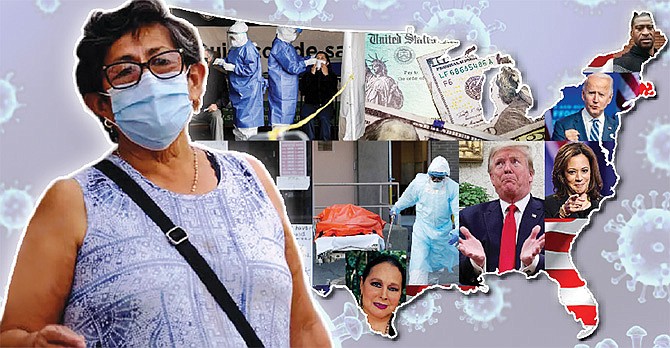The memes spread in the last days of 2019 asked the new year, 2020, to surprise us. So it was. Tremendous unprecedented surprises. On January 21, the Centers for Disease Control and Prevention (CDC) confirmed the first case of COVID-19 infection in the United States, although by then it was already known that a rapidly contagious disease was spreading through China and Asia.
By January 30, there were six confirmed cases and the news that set off the alarms: the disease is spread from person-to-person. By February 1, it was confirmed that the origin of the coronavirus was Wuhan (China). As of March 15, the Chinese-origin coronavirus epidemic was declared a pandemic by the World Health Organization.
Given the passivity of the Trump Administration and the Texas Government, Mayor Steve Adler and the City Council approve the ‘Stay Home – Work Safe’ provision, with the aim of reducing the chances of contagion and relying on the criteria of the population. The measure was extended several times and its effectiveness was and is undeniable.
While this was happening, all public events, concerts and sports activities were canceled. Many artists decided to continue broadcasting online, through their YouTube channels, or on various platforms. The face-to-face classes were suspended. Zoom became popular. Travel, by land or air, was restricted in the first months of the health crisis. The importance of wearing masks, an emblem of any preventive measure, became elementary and necessary to reduce the chances of contagion. For the first time in the modern history of this country, the Federal Government distributed personalized checks to millions of taxpayers, with the aim of alleviating the economic needs derived from the pandemic; unfortunately, the undocumented were excluded from that benefit. On the immigration front, the defeats of the Trump Administration stand out, except for the change in the citizenship test, which is now more demanding. On the political level, the presidential election of Joe Biden stands out, with just over eighty-one million votes, and the historic milestone of Vice President-elect Kamala Harris, the first woman and African American and Indian descendant.
Other events that made headlines: on January 26 the world witnessed the helicopter accident that blinded the lives of Kobe Bryant, his daughter Gianna and seven other passengers; the assassination of George Floyd (May 25) triggered a wave of national protests against the extreme violence used by the police; in December, the approval of Pfizer and Moderna vaccines. In Austin, the proliferation of homeless camps soared this year. A few days before the end of 2020, the UK authorities warn that a new strain of SARS-CoV-2, the root of COVID-19, is more contagious than those known so far and could be more lethal.
In addition to the pandemic, the deaths of known people added to the collective grief. Among others, died this year: Chilean writer Luis Sepúlveda (April 16); the Mexican actor Héctor Suárez (June 2); the Spanish singer Pau Dones (June 9); the novelist Carlos Ruiz Zafón (June 19); Manuel ‘Loco’ Valdés (August 28); the Mexican singer Xavier Ortiz (September 7); Ruth Bader Ginsburg, Supreme Court Justice (September 18); Joaquín Salvador Lavado, Quino, creator of Mafalda (September 30); actor Sean Connery (October 31), Mexican actress Magda Rodríguez (November 1), Mexican singer Flor Silvestre (November 25); and Diego Maradona (November 25).
2020 will pass but not the health crisis. For that to happen, months are missing, so any anomalous situation – political, economic or social – will exacerbate public perception, damaging attempts to return to normality. Only the union of the population will lessen the impact of the hard days that we still have to live.
THE DATA
In Central Texas, the grotesque note of 2020 is the compulsive purchase of toilet paper rolls.
–


